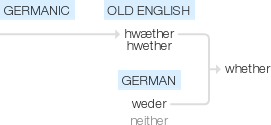Whether
Old English hwæther, hwether, of Germanic origin; related to German weder ‘neither’.
wiktionary
From Old English hwæþer, from Proto-Germanic *hwaþeraz, comparative form of *hwaz(“who”). Cognate with English either, German weder(“neither”), Swedish var, Icelandic hvor(“each of two, which of two”).
etymonline
whether (conj.)
Old English hwæðer, hweðer "which of two, whether," from Proto-Germanic *gihwatharaz (cognates Old Saxon hwedar, Old Norse hvarr, Gothic huaþar, Old High German hwedar "which of the two," German weder "neither"), from interrogative base *khwa- "who" (from PIE root *kwo-, stem of relative and interrogative pronouns) + comparative suffix *-theraz (cognate compounds in Sanskrit katarah, Avestan katara-, Greek poteros, Latin uter "which of the two, either of two," Lithuanian katras "which of the two," Old Church Slavonic koteru "which"). Its comparative form is either. Also in Old English as a pronoun and adjective. Phrase whether or not (also whether or no) recorded from 1650s.
